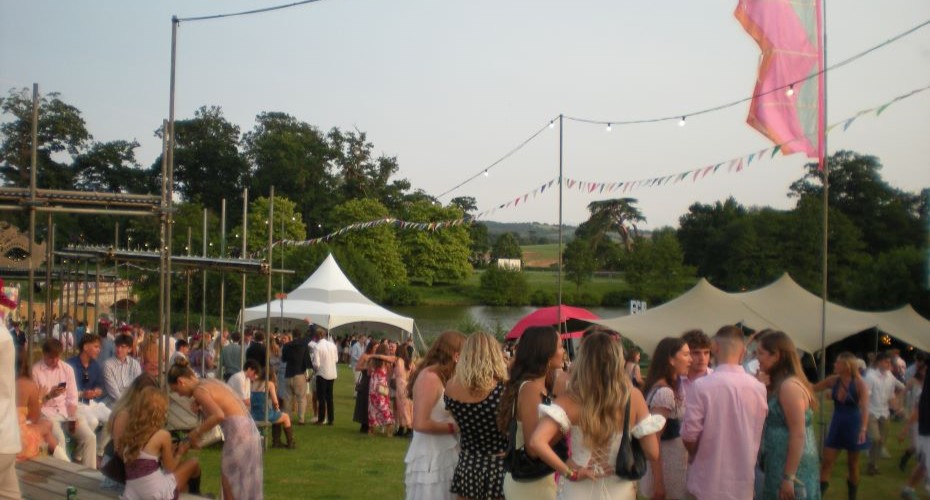Hi Everyone! I’m Eloise, a recent Film and Television Studies and Geography graduate from the University of Exeter. During my three years on my Flexible Combined Honours course, I was based at the Streatham Campus, but I am originally from Sussex.
Third year can seem like an overwhelming time in your degree. Everything seems to culminate to this final push; dissertations, deadlines, and pressure to think about the next steps – it is a lot on at one time. But hopefully by walking you through a year of my life as a finalist, I can show you how you can make the workload, future planning, and social life manageable to make the most out of the academic year.
The academic side
Firstly, if you’re new to the university credit system, each academic year is made up of 120 credits. Modules are either compulsory or optional, and they are usually worth 15 or 30 credits (with some, such as the dissertation module, accounting for 45 credits). This ensures your workload in the year is manageable.
I personally split my time evenly between my two subjects, allocating 60 credits to both each year. In my third year, I decided to take more modules in the first semester and therefore less in my second term. It, of course, meant that my first semester was a little more chaotic than most people’s, but it meant that after the Christmas break I had a lot more free time.
For me, I chose this split because I found I was more interested in the content offered in the first semester than the second, and the assessment types suited me based on previous module results. I got to take some really niche modules in both my subjects; in Film and Television Studies, I enrolled on ‘Cinema in the Anthropocene’ and ‘Film Audiences’. For Geography, I studied ‘Digital Geographies’, ‘Images of the Earth’, ‘Managing the Climate Emergency’, and ‘Water Resilience: Challenges and Solutions’.
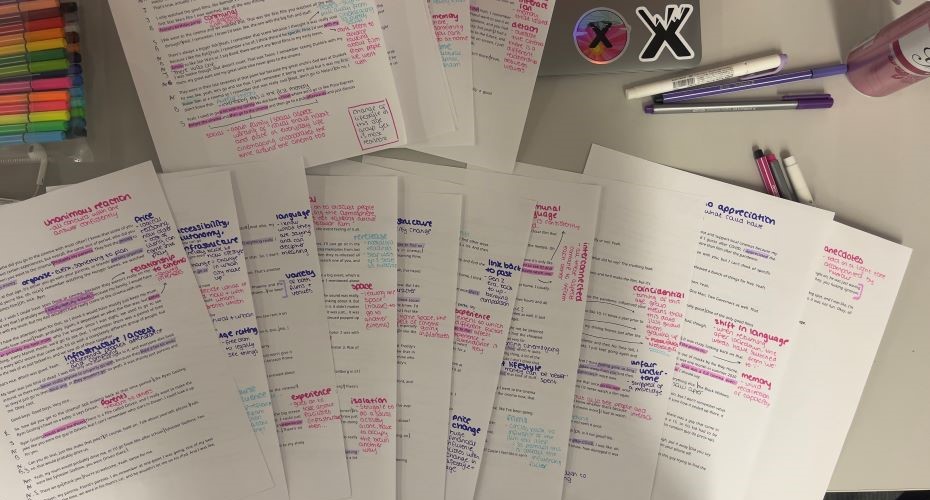
These modules had a variety of assessment types – which is important to consider when you are choosing your modules! I had some exams in both January and May. Most of my modules incorporated longer essays, particularly in Film and Television Studies as it is part of the Humanities, Arts and Social Sciences (HASS) department. But I have had some new and different forms of assessment this year, such as making a YouTube video about eSports gaming injuries for ‘Digital Geographies’ or designing an infographic about nature-based solutions for ‘Water Resilience’. Some modules had local fieldwork opportunities; for example, the water module took us across campus to the Lower Hoopern valley to discuss flood prevention techniques.
Both term one and two are comprised of lecturers, seminars, workshops, and office hours. These ‘contact hours’ tend to reduce throughout the three years of your course – although in my case the hours have stayed pretty consistent during my degree.
Timetabling
At the beginning of each term, when the timetables are released, I added my classes and events into my schedule. This allowed me to get an overview of each week and clearly see what time I had left for studying, socialising, and work.
As a student ambassador and content creator for the University, I am employed in a flexible role, so I choose when to work. This is ideal for students, as I can choose to spend less time working and more time studying when assignments tend to pile up towards the end of term. Throughout the term, I’d add any dates I’d applied to work to my calendar.
Now this is where I am different to other third year students – I didn’t do a dissertation (I know, shock horror)! As a Flexible Combined Honours student, I was able to do a dissertation in either Film and Television Studies (as a written 8,000 word dissertation or a creative dissertation (8-minute short film)) or Geography (12,000 word dissertation)… or just make up my 120 credits in more modules. So, my workload as a result looked very much like a typical second year timetable, but that didn’t mean the workload I endured was any less than a third year (thanks to the credit system). If you’re a prospective student considering a Flexible Combined Honours course in two or more subjects, don’t worry, you do not do double (or triple) the work! I just chose to allocate my time differently to most students.
So, whilst I didn’t have to time manage in the same way as those doing a dissertation, I still had to prepare for assessments and study for exams, as I tended to have more of those to make up for the 45-credit dissertation loss.
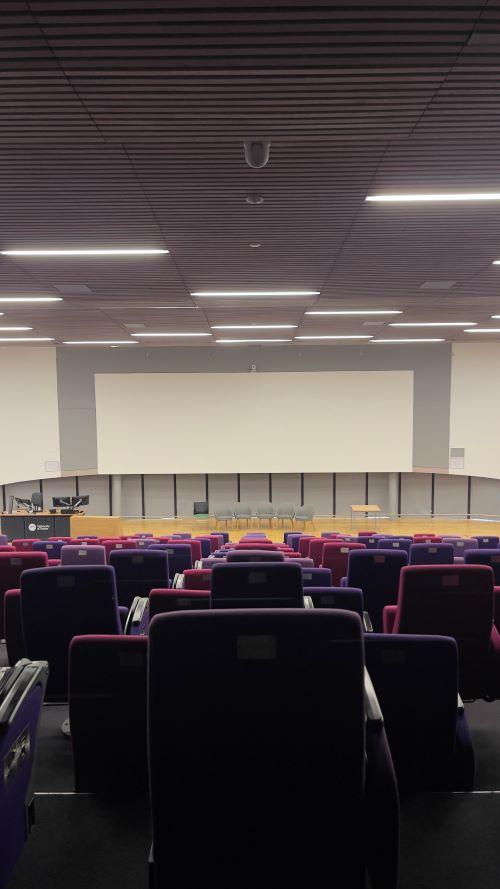
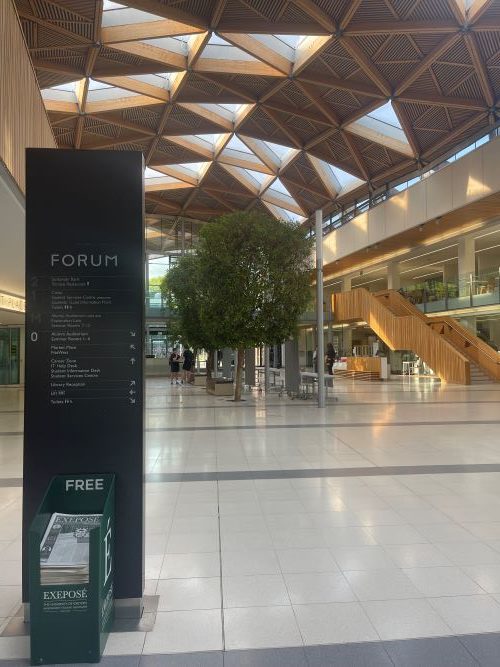
Where I saw some gaps in my day, I’d go to the library, try out a new coffee shop or explore on campus to find somewhere to study. It is a good idea to divide up your time in the week to dedicate sections for looking over material, doing required readings for the week, or studying for an upcoming exam or working on the next assignment. This means you get used to a routine, making the workload more manageable.
Everyone has their own strategy to revise or complete work – and as I tend to write essays the night before the deadline or study the day of the exam, you might not want to take advice from me! But the University definitely supports students with study advice, workshops and tips. If you’re a current student – use what is offered!
The Study Zone helps you find your groove with academic work and often hosts drop-in sessions weekly in the Forum. They also have an extensive online digital resource SharePoint to give you further advice – this saved me during exam week!
Equally, if workloads are getting too much, you can speak to the Student Guild (our student union) for advice, or the Wellbeing team if you need mental health support.
In my spare time…
I did quite a lot – is the short answer!
I have been the Print Sport Editor for the University’s student newspaper, Exeposé, meaning I write articles, pitch articles to writers and editors, proofread, and use Adobe software like Photoshop and InDesign! It is a lot of fun to go to the office biweekly to get this experience and add something impressive on the CV! It is also where I met a lot of my good friends too.
I also made lots of solid friendships from my sports club, Snowsports Exeter. I was in the 2s for the Female Slalom ski race team, and in the 3s for the Mixed. I trained twice a week in terms one and two at the dry ski slope in the city centre. Particularly during first term, I went to the Kings competitions in the southwest region. I visited Cardiff, Gloucester, and Pembrey!
There was also a trip to Edinburgh in November – which was a cunning distraction from the looming deadlines… although the 12-hour coach journey wasn’t as fun! The first teams competed in the BUCS competitions against the best in the country, and the other teams spent the weekend supporting them and exploring the Scottish city!
In semester two, I went on the Easter ski trip to Tignes in France! It was awesome to spend a week in the Alps with my friends carving the fresh powder and dancing on tabletops at après!
In first term, I also tried my hand at tennis and signed up for a 12-week crash course – it was a great way to try a new sport and gain a new skill! Me and my housemates have started badminton recently which has been super fun to do with a group of friends!
I even dabbled in some radio hosting this year! I joined XpressionFM, the student radio station, and joined some sessions on Tuesday Night Sport and watched an Exeter Chiefs vs Harlequins match at Sandy Park!
Even if you are about to enter your third and final year, it is never too late to join a new society or start a sport – even if you have no experience! I realised I loved badminton and got some time on air with the radio station to add to my portfolio… trying new things can be good for your health and also improve your employability!

Employability
Little and often is key in third year. Have a look at graduate roles and schemes early in the first semester, as that is when they tend to be advertised. Then maybe spend some time looking at further study or graduate jobs. Or perhaps, like me, you are considering a gap year. Planning and getting ahead, even if it is a little here and there in your week, can set you up well for the summer and your next steps.
Even if this isn’t your last year at the University of Exeter, thinking ahead about accommodation for the next year, for example, could mean you secure a better deal on a house as well as take the stress of the process off your shoulders so you can focus on your studies. The Guild can help you find flatmates through their Flatmate Finder events, or help you read through a contract or find reliable landlords.
I’m looking at taking a year out after graduating to give me some time to rest and travel but also gain some experience before I apply to jobs either in the film industry or sports journalism. I’ve been looking at routes around Europe to start with, but I’m also considering volunteering further afield at a turtle sanctuary in Costa Rica or a dog sanctuary in Kenya! Just spending some time browsing for a few minutes each day at different organisations and travel destinations makes the whole process of planning a year out less daunting. I’ve also been connecting with some of my friends who graduated a few years ago for advice from their travels too!
The third term
The last semester at the University of Exeter tends to be quieter in comparison to the others. With deadlines for the final pieces of coursework usually around late April / early May, and exams finishing by the end of the fifth month, it gives students a lot of free time.
I have to admit, I was frantically revising for my exams in mid-May after completing some work experience in April and having long research essays due earlier on in the month. My tip to other students would be to ask for help earlier – speaking to Study Zone advisors so they can give you tailored support, asking friends to study together to make the process more fun, and giving more time to my physical and mental health would have been beneficial.
But after I put my pen down in an exam for the last time, my timetable instantly transformed… I had nothing on my calendar! That was a surreal feeling, but I managed it well by spending time with people!
Others in your cohort will be going through the same thing so make sure to celebrate your achievement for completing your degree! With the weather typically glorious in the third term – although we must remember the British summer does have its moments – students tend to flock to the beaches of nearby Exmouth and Dawlish Warren.
It is also a time when the clubs and societies you have been part of celebrate the end of the year. I went to an end of season dinner with Snowsports, a summer soiree with Xmedia (the student media societies), and a summer ball with the entire University called Enchanted Garden Ball. Other events included Hijacked festival at Double Locks (including huge headliners like Interplanetary Criminal) and Party on the Beach (a rugby and music festival at Exmouth). It literally felt like we were on holiday!


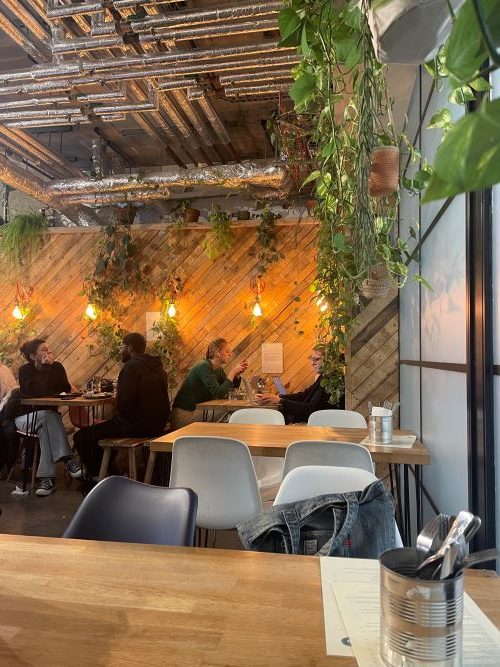
There have been several house parties and club nights, coffee dates with friends at the quay, and hikes in Dartmoor too. I made an Exeter Bucket List at the beginning of the academic year and have been ploughing my way through it, ticking off events like going to an Exeter City Football Club match, varsity rugby events, and watching a play at the Northcote Theatre!
Although I may not have had any academic work by the end of the year, I still maintained a structure in third term by timetabling my week. Between meeting up with friends, starting Pilates and yoga classes, and working, I have managed to keep a routine.
Looking back on an amazing year
Third year can have its moments where everything seems to be happening at once and then swiftly be followed by a completely clear schedule – it is an emotional rollercoaster! But by taking time for yourself and having good time management, the year will breeze by.
I recommend making a list of things you want to do in Exeter before you graduate (I’m sure my absurdly long list can’t be beaten)! This way you can make sure you see off your final year in style knowing you did everything you wanted to. Get involved and spend time with people – it won’t be long until you aren’t all in the same postcode anymore, so cherish the time together!
The University of Exeter and the city is a special place – go out and explore it!

